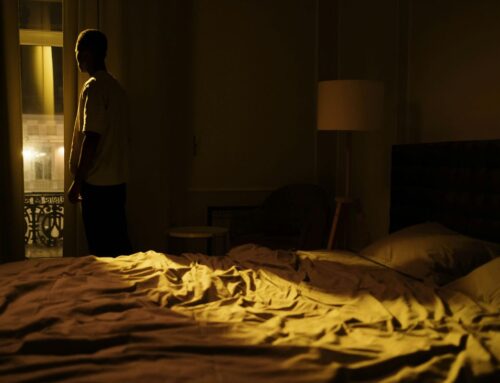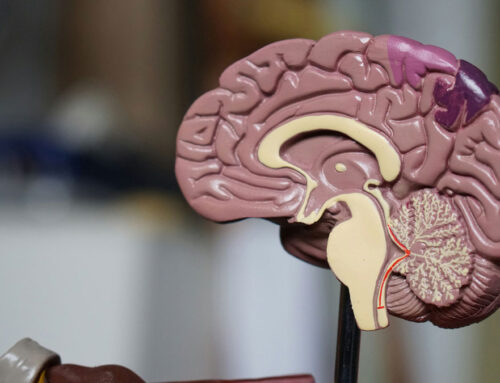When you’re running on fumes, getting through the day can feel like a real uphill battle. It may seem like everyone around you has energy to spare while you’re counting down the minutes until you can crash into bed. If this sounds familiar, then your body may be backlogged on sleep. Sleep deprivation can be a frustrating and exhausting experience, but we’re here to support you on your journey towards brighter, more rested days.
What is sleep deprivation?
Sleep deprivation isn’t just about feeling groggy in the morning. It’s a multifaceted experience that affects both our mind and body. It occurs when we don’t get the amount of sleep that we need or if our sleep is of poor quality.
Did you know that sleep deprivation can occur after just 24 hours of no sleep? However, the longer you stay awake, the more intense the symptoms become. While this can vary from person to person, most experts agree that 7-8 hours of sleep per night is ideal for general health.
Recognizing the telltale signs
Beyond the fog of fatigue, your body may signal its distress in different ways. Mentally, you might notice:
- Mood swings
- Drowsiness
- Lack of coordination
- Creative blocks
When it comes to your physical health, keep an eye out for:
- High blood pressure
- Metabolic syndrome (which can lead to blood sugar imbalance)
- Weakened immunity
- Digestive issues like constipation or diarrhea
The importance of sleep
Think of sleep as the ultimate multitasker, boosting your brainpower, sharpening your decision-making skills, and even enhancing intelligence and creativity. Sleep helps to regulate our mood by lowering stress, anxiety, and symptoms of depression. Additionally, the immune system regenerates overnight, clearing the brain of toxins and allowing organs to repair themselves.
Short term effects of sleep deprivation
When you’re running on empty, your body’s response system kicks into high gear revving up the sympathetic nervous system and the hypothalamic-pituitary-adrenal (HPA) axis—the duo which governs our fight-or-flight response. From disrupting the body’s natural rhythm to triggering inflammatory responses that heighten stress levels, the short-term effects of sleep deprivation can leave us feeling overwhelmed. Moreover, impaired memory and performance further compound these challenges, making it harder to navigate your day-to-day responsibilities. Let’s take a closer look:
Lack of sleep and immune response
Ever wonder why you seem to catch a bug when you’re low on sleep? When we don’t get proper sleep, the production of cytokines (proteins that regulate inflammation) decreases, which weakens our body’s ability to fend off common illnesses like the common cold.
In other words, skimping on sleep not only leaves us feeling rundown but also leaves our immune system less equipped to combat the pathogens we encounter daily. A good night’s sleep isn’t just about feeling refreshed, it’s about arming your body with the defenses it needs to stay healthy.
Sleep deprivation and weight gain
When we’re low on quality sleep our hunger and satiety hormones go haywire. Ghrelin, our hunger hormone, kicks into high gear, making us want to eat more. At the same time, our satiety hormone, leptin, takes a backseat, leaving us feeling hungry even when we’re not. Research shows that those of us getting only six hours of sleep per night are 23% more likely to experience unexpected weight gain, and this risk increases to 73% for those getting just four hours.
In essence, giving your body the rest it needs is a powerful act of self-care, supporting you in feeling your best inside and out.
Sleeplessness and cognitive function
Ever had those days where it feels like your brain is operating in slow motion? Sleep deprivation can throw off your cognitive function in the short term, making it harder to think clearly and focus on tasks. Research shows that sleep deprivation leads to lower alertness and concentration. It can also hamper our ability to perform tasks that require logical reasoning or complex thought.
Lack of sleep can make even the simplest decisions feel overwhelming. And let’s face it, we’ve all been there. Whether it’s struggling to remember something important or feeling like your mind is in a constant fog, that’s your brain’s way of saying, “Hey, I need some rest”.
Long term effects of sleep deprivation
Over time, consistently missing out on quality shut-eye can set the stage for a slew of health issues. Research shows that getting less than 6 hours of sleep every night can make us more susceptible to:
- Hypertension
- Coronary heart disease
- Diabetes
- Alzheimer’s disease
- Depression
Too little sleep can be hard on your heart
Navigating the challenges of too little sleep can weigh heavily on your heart. Insufficient rest not only leaves you exhausted, it also takes a toll on heart health by raising blood pressure and heart rate over time. This chronic strain can result in an increased risk of a stroke or heart attack. Additionally, sleep deprivation can trigger physiological and hormonal changes that increase both blood pressure and blood sugar.
Did you know that 9 in 10 Canadians have at least one risk factor associated with heart conditions? As heart disease is largely preventable, understanding the risk factors can help you make informed choices for a heart-healthy lifestyle. When it comes to sleep habits, small changes can make all the difference in caring for your heart.
Sleep deprivation and Alzheimer’s disease
Research suggests that disrupted sleep patterns may interfere with the brain’s ability to clear out toxins and waste, increasing the risk of developing Alzheimer’s. Think of it like a clogged drain that prevents proper cleaning—the buildup of harmful substances can contribute to the development of the disease over time.
Who’s most susceptible to sleep deprivation?
Recent reports show that around 25% of Canadians are dissatisfied with their sleep. Around 10% to 15% report symptoms of insomnia associated with daytime consequences, and 6% to 10% meet the criteria for an insomnia disorder.
While sleep deprivation doesn’t discriminate, there are certain groups who are more likely to fall prey to its clutches. New parents and shift-workers are among the most likely to feel the effects of sleep deprivation.
Those who spend lots of time behind blue-light emitting screens such as teenagers, students, and gamers are more likely to have sleep issues. High-performance managers and executives working under increased pressure are also equally susceptible. Take our sleep quiz to find out if you might be experiencing sleep deprivation.Building better sleep habits
The power of bedtime routines
Good sleep habits lay the foundation for our well-being, no matter our age. Getting adequate sleep and limiting sleep disruptors during the day support our circadian rhythm. That’s where a solid bedtime routine comes in. Here are a few bedtime habits that will help you ease into drift off:
- Relax for 30 minutes: Wind down with quiet activities like reading, relaxing music or gentle stretches to help prepare the mind for rest.
- Dim the lights: Bright lights can hinder the production of melatonin, the hormone that the body creates to make you feel sleepy.
- Opt for softer lighting: This signals to your brain that it’s time to wind down.
- Ditch the screens: Cell phones, tablets, and television screens emit blue light which decreases our melatonin production. Make the last 30-60 minutes of your day a device-free time.
Lifestyle habits for better sleep
Your sleep quality isn’t just determined by how early you hit the sack, it’s also influenced by your habits throughout the day. Let’s take a look at a few small changes that can help you support your circadian rhythm and put restless nights to bed:
- Soak up the sunlight: Sunlight is one of the regulators of our circadian rhythm. Aim for 10 minutes of sunlight every morning.
- Get moving: Regular exercise offers a host of health benefits and makes it easier to sleep at night. It not only improves our sense of well-being, but regular physical activity helps to reduce levels of stress hormones like cortisol, making it easier to relax and drift off into sleep at night.
- Avoid alcohol: While alcohol might make you feel drowsy at first, as your body metabolizes the alcohol, it can disrupt your sleep cycle, leading to fragmented, less restorative rest. It also disrupts your body’s ability to detoxify while you sleep, making it harder to wake up feeling rested.
- Avoid caffeine after 2 PM: Caffeine is a stimulant that keeps us awake. But did you know that it has a half-life of about 5-6 hours? This means that it can linger in your system long after that last sip, disrupting your ability to fall asleep and stay asleep. If you’re already dealing with the effects of sleep deprivation, adding caffeine to the mix can further exacerbate feelings of fatigue and grogginess.
Finding support for sleepless nights
Whether you’re battling the effects of sleep deprivation, struggling to unwind after a long day, or simply seeking guidance on how to improve your sleep habits, we’re here to lend a hand. Visit https://stg.canprev.ca/sleep/ for expert tips, resources, and quality supplements to help you reclaim your nights and energize your days.
Navigating life without sleep can truly take a toll on our minds and bodies. However, every small step you take toward better sleep is a victory worth celebrating. By prioritizing self-care and making small changes to your daily routine, you set the stage for healthy, restful slumber.
Sources:
Sleep habits and susceptibility to the common cold
Inadequate sleep as a risk factor for obesity: analyses of the NHANES I
Sleep deprived? What missing too much sleep might be doing to your body
Not all sleep is equal when it comes to cleaning the brain
Prevalence of insomnia for Canadians aged 6 to 79
Connected by the numbers







Leave A Comment